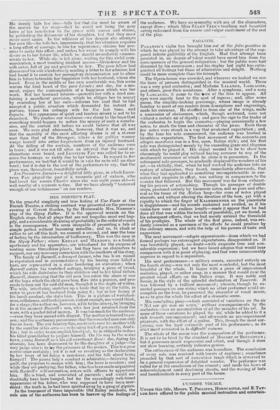MRS. NORTON'S PLAY.
To the graceful simplicity and true feeling of Une Faute at the French Theatre, a striking contrast was presented on the previous evening at Covent Garden, by the Honourable Mrs. NORTON'S play of the Gipsy Father. It is the approved maxim on the English stage, that all plays that are not tragedies must end hap- pily, and a considerable straining of probability in the order of events is the consequence. We seem incapable of presenting a tale of simple pathos without becoming maudlin ; and so, to cloak or rather to set off this fault, we commit a second, and mar the tone of feeling by the introduction of buffoonery. This was the case in the Gipsy Father; where KEELEY and 'MEADOWS, as a foolish apothecary and his apprentice, are introduced for the purpose of venting some threadbare jokes ; but they have no characters to support, nor any necessary connexion with the incidents of the story. The family of Barwell, a decayed farmer, who has b: en ruined in reputation and in circumstances by his having once killed a hare, are represented in a state bordering on starvation; • when Burwell enters his wretched cottage, bringing a piece of bread, -which his wife distributes to their children and to her blind father. Barwell, discovering that the old man has eaten the share of one of the boys which the child gave him, flies into a passion, and pro- ceeds to turn out the said old man, though it is the depth of winter. The wife, interfering, snatches up a knife that lay on the table, in order to prevent her husband from using it ; but in her frenzy at his harsh conduct, she stabs him. This is a picture of wretched- ness, selfishness, andbrutalpassion, violent enough, one would think, for a stage; the authoress, however, adds to the misery, by bringing in at the moment Barwell's son, who has just returned from the wars, with a pocket full of money. It was too much for the audience —even they were moved with disgust. The mother is hurried to pri- son ; and the apothecary pronounces 1 hat the wounded man can only live an hour. The son hearing this, resolves to save his mother's life by the sacrifice of his own—a redeeming trait of generosity, doubt- less : but in order to accomplish his object, he is obliged to induce his blind grandfather to perjure himself. On his way to the assize town, young Barwell sees his o:d sweetheart Rose: she, during his absence, has been discovered to be the daughter of a judge—the very judge who is to is y the prisoners at the assizes. This is a poor contrivance certainly ; yet it is not so revolting as the declaration by her lover of his being a murderer, and his talk about being hanged ! The young lady's conduct is admirable,—believing his guilt, she proposes to escape with him ; the lover is resolute ; and while they are parleying, her father, who has been made acquainted with &melts self-accusation, enters with officers to apprehend him. He is tried, and convicted of parricide ; and would un- doubtedly have been hanged, but for the exceedingly well-timed appearance of his father, who was supposed to have been mur- dered : the truth is, he had been spirited away by a gang of' gipsies. In the treatment of these impossible Old Bailey incidents, the sole aim of the authoress has been to harrow up the feelings of the audience. We have no sympathy with any of the characters, except Rose; which Miss ELLEN TREE'S touching and beautiful acting redeemed from the coarse and vulgar excitement of the rest of the play.


























 Previous page
Previous page